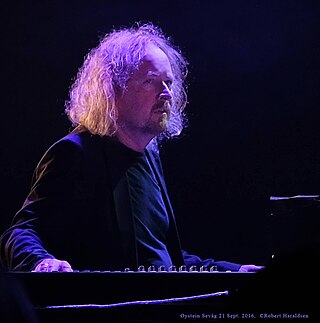Kevin Braheny Fortune (born Kevin Braheny, 1952) is an American musician and composer of ambient music, producer, engineer, and session musician.
Kevin Braheny Fortune (born Kevin Braheny, 1952) is an American musician and composer of ambient music, producer, engineer, and session musician.
Braheny was on the early design team of the Serge synthesizer, a company building modular synthesizers. [1] [2] He was also the chief engineer at Sound Transform Systems headed by Rex Probe.[ citation needed ] In 1977, he built his highly customized Mighty Serge, [3] a 15-panel system that he would use on his own albums. He also built a system for Craig Huxley that he then sold to Michael Stearns, who Braheny taught how to play and customize it. [4]
Braheny recorded the track "Perelandra" (later known as "Perelandra Dawn") in early 1978, which created a strong response following several years of broadcast on Stephen Hill's radio show Hearts of Space on KPFA-FM. After Hill suggested to Braheny that he release it on an album Braheny recorded a second piece, "The Way Home", to accompany it, while making alterations to "Perelandra" to create a second version of the track. The album was released in 1984 as the debut record on Hill's label Hearts of Space Records, named Perelandra, and since reissued as The Way Home. [5] In 1980, following encouragement from Stearns and Hill, Braheny setup his own record label and released his second album, Lullaby for the Hearts of Space. The 35-minute title track was an improvised live performance on Hill's show in March of that year. The second piece, "After I Said Goodnight", was played live at a class hosted by Emilie Conrad, founder of the Continuum Movement. It features sounds of crickets, bells, a jungle atmosphere, tape loops of his own voice, and a saxophone. [5] In the mid-1980s, Braheny was approached by science author and educator Timothy Ferris to compose the soundtrack for a planetarium show called Galaxies that was based on his same-titled book. He recorded it using Richard Burmer's home studio, and although he resisted putting it out as a standalone album because of its undeveloped nature, he eventually released it as Galaxies in 1988. [5] Braheny's following album, Secret Rooms, was inspired by his experiences of spirits talking through him, "musically and then verbally", and became a "trance-channel" medium. Two tracks recorded for the album were rejected by his label. [5]
Braheny also built the electronic wind instrument EWI (pronounced "ee-wee") for Nyle Steiner, and plays the instrument on Western Spaces (1987).
Around 1991, Braheny relocated from Los Angeles to San Francisco. [5] In the following year he became ill with an autoimmune disease and, coupled with "six or seven life stresses" going on at the same time, led him to pause his music career and moved to the northern mountains. [6] Following the release of The Spell with Tim Clark in 1996, Braheny would not release music for another 22 years. During this time he worked as a therapist specialising in sexual healing, often working with survivors of sexual abuse. [6] He returned to music in 2018. [6]
Around 1977, Braheny began a parallel career in the healing arts. In 2006, he had been teaching Tantra both privately and in groups for around 18 years. [5]

Steve Roach is an American composer and performer of ambient and electronic music, whose recordings are informed by his impressions of environment, perception, flow and space. His work has been influential in the trance and new-age genres.

Structures from Silence is the third studio album by American ambient musician Steve Roach. It was released in 1984 on Fortuna.

Western Spaces (1987) is a collaborative album by the American ambient musicians Steve Roach and Kevin Braheny. This album is the first of Steve Roach’s many musical tributes to the Southwestern Desert.

Dreamtime Return (1988) is a double album by the American ambient musician Steve Roach, based on Australian Aboriginal culture and the concept of the Dreamtime. Described as "one of the pivotal works of ambient music" and "groundbreaking," the album has been included on a number of lists of the world's best music, including 1,000 Recordings to Hear Before You Die.

Desert Solitaire (1989) is a collaborative album by U.S. ambient musicians Steve Roach, Kevin Braheny, and Michael Stearns. This album was conceived as a follow up to Roach and Braheny's 1987 collaboration Western Spaces.

Jonn Serrie is an American composer of space music, a genre of ambient electronic music, and New Age music. He has recorded at least 18 albums and worked on projects for Lucasfilm, IMAX Corporation, NASA, the United States Navy, Hayden Planetarium, Expo Seville, and CNN.

Space music, also called spacemusic or space ambient, is a subgenre of new-age music and is described as "tranquil, hypnotic and moving". It is derived from ambient music and is associated with lounge music, easy listening, and elevator music.

Bruce Katz is an American musician, playing piano, organ and bass guitar. From 1996 to 2010, he was on the faculty at the Berklee College of Music in Boston as an associate professor. He founded his own musical group, the Bruce Katz Band in 1991 and has recorded and toured with that band to the present. He has also recorded and toured with many other well-known artists in the Blues, Jazz and Rock music world.
Michael Stearns is an American musician and composer of ambient music. He is also known as a film composer, sound designer and soundtrack producer for large format films, theatrical films, documentaries, commercials, and themed attractions.

Richard Steven Burmer was an American composer, engineer, sound designer, musician and ethnomusicologist. His work with electronic music combined with musical styles and instruments from around the world formed his own unique and distinct sound.
Perelandra can refer to:
M'Ocean is an album of electronic ambient music by the U.S. musician Michael Stearns. It is a collection of seven pieces, either live performances or studio engineered tracks, produced between 1978 and 1982.
Planetary Unfolding (1981) is an album of electronic ambient music by composer and keyboardist Michael Stearns. It is considered a classic of ambient music.
Thom Brennan is an American electronic ambient musician, composer and synthesist. Active since the 1980s with his first album Mountains (1987), he belongs to the scene of Californian pioneers of electronic music. His style encloses the principal traits characterizing the evolution from Terry Riley's and Morton Subotnick's minimalism to the form of electronic new-age suite.

The Serge synthesizer is an analogue modular synthesizer system originally developed by Serge Tcherepnin, Rich Gold and Randy Cohen at CalArts in late 1972. The first 20 Serge systems were built in 1973 in Tcherepnin's home. Tcherepnin was a professor at CalArts at the time, and desired to create something like the exclusively expensive Buchla modular synthesizers "for the people that would be both inexpensive and powerful." After building prototypes, Tcherepnin went on to develop kits for students to affordably build their own modular synthesizer, production taking place unofficially on a second floor CalArts balcony. This led to Tcherepnin leaving CalArts in order to produce kits commercially, starting in 1974.

Lullaby for the Hearts of Space (1980) is an album by the American ambient musician Kevin Braheny.

Øystein Sevåg is a Norwegian composer and keyboardist. His music touches on classical, New Age and jazz styles.

Jesse James Dupree is an American musician, television personality, and businessman. He is the lead singer, guitarist, and primary songwriter in the rock band Jackyl, founded in 1991. As a solo performer, he released albums in 2000 and 2008 under the names of "Jesse James Dupree" and "Jesse James Dupree & Dixie Inc.", respectively.

Novus Magnificat: Through the Stargate (1986) is an album by American musician Constance Demby, with additional sonic textures by composer Michael Stearns. The album sold over 200,000 copies worldwide. In 2002, it was voted "The 25 Most Influential Ambient Albums of All Time".
Valley Entertainment is an American independent record label and music distributor based in New York City, United States. The company was founded in 1994 by Barney Cohen and Jon Birge. In 2001, it acquired the prestigious back catalogue of space, ambient, and new-age music from Hearts of Space Records. As of 2017, it has a catalogue of about 375 releases.